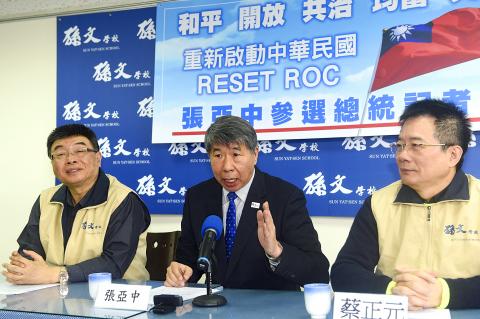Sun Yat-sen School president Chang Ya-chung (張亞中) yesterday announced that he would seek the Chinese Nationalist Party’s (KMT) nomination to run for president in 2020, saying that he would engage in talks with Beijing and explore the possibility of unification if elected.
Chang, a National Taiwan University political science professor and former diplomat, is the second KMT member to express his intention to vie for the presidential nomination after former New Taipei City mayor Eric Chu (朱立倫).
By joining the primary race, he hopes to “reset the Republic of China and the KMT” as the nation faces a series of political, economic and identity crises at home and abroad, he told a news conference at the KMT-affiliated school in Taipei.

Photo: George Tsorng, Taipei Times
The KMT must “eliminate its feudal culture and tendency to ignore rules” and “reform itself into a party with ideals and clear rules, energetic and close to the public,” he said.
With new-found values, the party could reset the nation, beginning with the 2020 presidential election, he said.
Commenting on Chines President Xi Jinping’s (習近平) call on Wednesday last week for unification, Chang said that while Xi proposed “one country, two systems” as a framework for governance after unification, he is more concerned about putting an end to the hostility between the two sides, which would be “more practical and necessary.”
He said he would sign a peace treaty with Beijing on the premise of “one China, with each side having its own constitutional government” to ensure the peaceful development of both sides.
Following that, “it would be natural to explore the option of unification,” he said, adding that the two sides of the Taiwan Strait are like “brothers of one family” and “there is nothing brothers cannot talk about or cannot compromise on.”
A peace treaty would allow the government to reduce its military spending, and focus on economic development and social security, he said.
It would also pave the way for negotiating increased participation by Taiwan in international organizations and meetings, he added.
“The KMT and the Democratic Progressive Party have both been avoiding elaborating on cross-strait relations, but the problem can only be solved by confronting it,” he said.
Once an aide of Hung Hsiu-chu (洪秀柱) when she was KMT chairwoman, Chang said that he believes Hung would support him, as they “share similar beliefs.”
“Hung played the first half and I will play the second half,” he added, referring to Hung’s short-lived bid for presidency in 2015.
Hung, who advocated a “one country, same interpretation” formula, was nominated as the party’s presidential candidate in July 2015, but replaced by Chu after three months, as a majority of party members found her support for unification controversial.
Chang’s platform also includes replacing the semi-presidential system with a parliamentary system, increasing the number of legislative seats from 113 to 200, abolishing the Transitional Justice Commission, and scrapping all curriculum guidelines for history and social studies previously issued by the government in favor of allowing schools and parents to choose their own textbooks.

Chinese Nationalist Party (KMT) Chairman Eric Chu (朱立倫), spokeswoman Yang Chih-yu (楊智伃) and Legislator Hsieh Lung-chieh (謝龍介) would be summoned by police for questioning for leading an illegal assembly on Thursday evening last week, Minister of the Interior Liu Shyh-fang (劉世芳) said today. The three KMT officials led an assembly outside the Taipei City Prosecutors’ Office, a restricted area where public assembly is not allowed, protesting the questioning of several KMT staff and searches of KMT headquarters and offices in a recall petition forgery case. Chu, Yang and Hsieh are all suspected of contravening the Assembly and Parade Act (集會遊行法) by holding

PRAISE: Japanese visitor Takashi Kubota said the Taiwanese temple architecture images showcased in the AI Art Gallery were the most impressive displays he saw Taiwan does not have an official pavilion at the World Expo in Osaka, Japan, because of its diplomatic predicament, but the government-backed Tech World pavilion is drawing interest with its unique recreations of works by Taiwanese artists. The pavilion features an artificial intelligence (AI)-based art gallery showcasing works of famous Taiwanese artists from the Japanese colonial period using innovative technologies. Among its main simulated displays are Eastern gouache paintings by Chen Chin (陳進), Lin Yu-shan (林玉山) and Kuo Hsueh-hu (郭雪湖), who were the three young Taiwanese painters selected for the East Asian Painting exhibition in 1927. Gouache is a water-based

Taiwan would welcome the return of Honduras as a diplomatic ally if its next president decides to make such a move, Minister of Foreign Affairs Lin Chia-lung (林佳龍) said yesterday. “Of course, we would welcome Honduras if they want to restore diplomatic ties with Taiwan after their elections,” Lin said at a meeting of the legislature’s Foreign Affairs and National Defense Committee, when asked to comment on statements made by two of the three Honduran presidential candidates during the presidential campaign in the Central American country. Taiwan is paying close attention to the region as a whole in the wake of a

OFF-TARGET: More than 30,000 participants were expected to take part in the Games next month, but only 6,550 foreign and 19,400 Taiwanese athletes have registered Taipei city councilors yesterday blasted the organizers of next month’s World Masters Games over sudden timetable and venue changes, which they said have caused thousands of participants to back out of the international sporting event, among other organizational issues. They also cited visa delays and political interference by China as reasons many foreign athletes are requesting refunds for the event, to be held from May 17 to 30. Jointly organized by the Taipei and New Taipei City governments, the games have been rocked by numerous controversies since preparations began in 2020. Taipei City Councilor Lin Yen-feng (林延鳳) said yesterday that new measures by